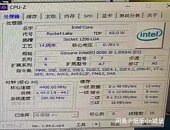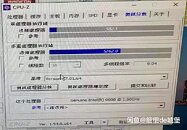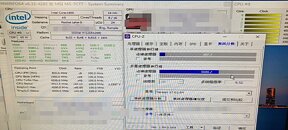Sunday, December 20th 2020

Intel Core i9-11900 and i9-11900K (ES) Alleged CPU-Z Bench Numbers Reveal a 12% IPC Gain
Benchmark numbers of an upcoming Intel Core i9-11900 (non-K) and i9-11900K processor engineering samples allegedly obtained on CPU-Z Bench reveal that the chip will deliver on the company's "double-digit IPC gain" promise for the "Rocket Lake" microarchitecture. The i9-11900 (non-K) sample posted a single-threaded performance score of 582 points, while the i9-11900K ES posted 597 points, which are roughly 12% higher than typical CPU-Z Bench single-thread numbers for the current-gen i9-10900 (non-K) and i9-10900K "Comet Lake-S" processors. The multi-threaded score of the i9-11900 (non-K) ES, at 5262 points, ends up just around 5-10% lower than that of the i9-10900, despite a deficit of two cores. Intel's 11th Gen Core "Rocket Lake-S" story is hence shaping up to be that of increased gaming performance from the IPC gain, while roughly the same multi-threaded performance as the 10th Gen "Comet Lake-S."
Source:
HXL (Twitter)



47 Comments on Intel Core i9-11900 and i9-11900K (ES) Alleged CPU-Z Bench Numbers Reveal a 12% IPC Gain
That was running optimized Intel Fortran to design Finite Impulse Response Filters. A 10% increase in speed would have been appreciated.
:kookoo::kookoo::kookoo:
I bet AMD will release an XT/Zen3+ refresh soon after on an improved 7nm node with 5% performance gains, since Zen3 has been released on the same exact 7nm node as Zen2, which seemed weird to me at first, but makes sense. Make more money now by using the same 7nm process with no increased costs, and have the 7nm+ in your back pocket later on to combat Intel AND justify keeping MSRPs exactly where they are despite increased competition.
Multi core, again, much lower frequency
And even with much lower frequency, it equals or beats 9900k/10700k.
11900k will be similar to 10900k multicore and better than all 10th gen in single core.
The results are underwhelming indeed, but there is so much you can do on 14nm before going overboard with power consumption.
Sidegrade at best, in my opinion.
The second screen is for the 11900 and the last is 11900k?
Neither of them are any meaningful percentage faster than what was already on the market.
Now imagine a 11900K 5.3GHz score.
I think it's quite impressive what Intel have achieved here on an old 14nm Uarch. Within spitting distance of AMD's IPC lead.
Having said that - 8 cores isn't going to be enough on the productivity side of the equation, even if they are marginally better in gaming.
Same goes for the top end GPUs, if you need cognitive dissonance the marketing is happy to provide.